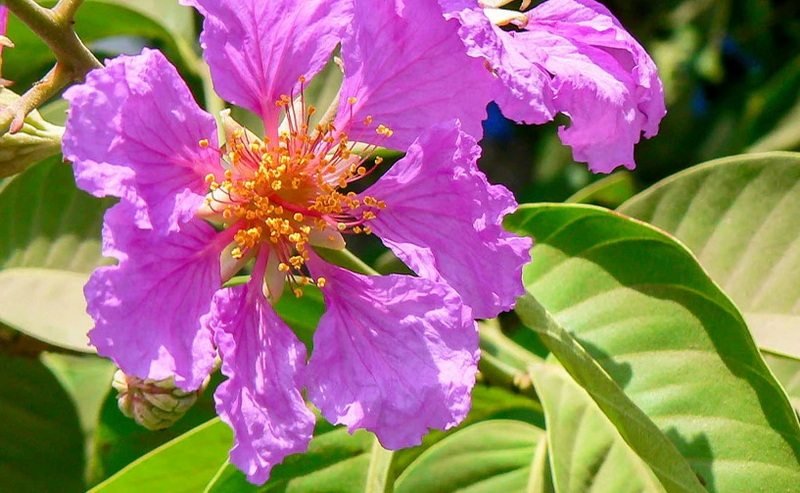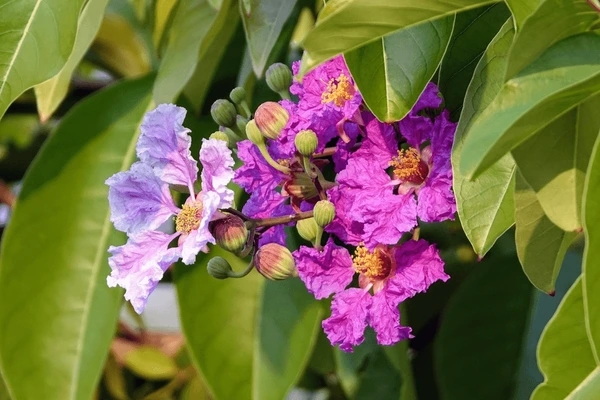Content Menu
● Introduction to Banaba Leaf Extract
>> Corosolic Acid and Its Effects
● Banaba Leaf Extract and Blood Pressure
>> Clinical Trial Results
● Mechanisms Behind Blood Pressure Reduction
>> Antioxidant and Anti-inflammatory Effects
● Broader Health Benefits of Banaba Leaf Extract
● Potential Side Effects and Precautions
>> Interactions with Medications
● Expanded Discussion on Mechanisms
>> Role of Ellagitannins
>> Impact on Lipid Metabolism
● Broader Applications and Future Research Directions
>> Potential in Weight Management
>> Need for Long-Term Studies
>> Integration with Other Therapies
● Conclusion
● FAQs
>> 1. What is Banaba Leaf Extract Used For?
>> 2. How Does Corosolic Acid Lower Blood Sugar?
>> 3. Is Banaba Leaf Extract Safe?
>> 4. Can Banaba Leaf Extract Help with Weight Loss?
>> 5. How Should I Consume Banaba Leaf Extract?
● Citations:
Banaba leaf extract, derived from the plant Lagerstroemia speciosa, has been traditionally used in folk medicine for its potential health benefits, including lowering blood sugar levels and improving cardiovascular health. Recent studies have explored its effects on metabolic syndrome, insulin sensitivity, and lipid profiles, which are closely linked to blood pressure regulation. This article delves into the scientific evidence supporting the use of Banaba leaf extract for lowering blood pressure and discusses its broader implications for cardiovascular health.

Introduction to Banaba Leaf Extract
Banaba leaf extract is rich in bioactive compounds such as corosolic acid, ellagitannins, and gallotannins, which are attributed to its therapeutic properties. Corosolic acid, in particular, has been shown to have anti-inflammatory, antioxidant, and hypoglycemic effects, making it a potential candidate for managing conditions like metabolic syndrome and type 2 diabetes.
Corosolic Acid and Its Effects
Corosolic acid is known for its ability to enhance insulin sensitivity and reduce blood glucose levels by inhibiting the digestion of carbohydrates and promoting glucose uptake in cells. While its primary focus has been on blood sugar control, its impact on other metabolic factors, including blood pressure, is also noteworthy.
Banaba Leaf Extract and Blood Pressure
Research on Banaba leaf extract's effect on blood pressure is promising but limited. A clinical trial involving patients with metabolic syndrome found that Banaba extract significantly reduced systolic blood pressure (SBP) over a 12-week period. This reduction in blood pressure is crucial for mitigating the risk of cardiovascular diseases.
Clinical Trial Results
A randomized, double-blind, placebo-controlled trial conducted on 24 patients with metabolic syndrome showed that those receiving Banaba extract (500 mg twice daily) experienced a decrease in SBP from 121.5 ± 12.9 mmHg to 116.3 ± 9.8 mmHg (P = .050). This decrease, although modest, suggests that Banaba extract may contribute to blood pressure management[1][3].
Mechanisms Behind Blood Pressure Reduction
The mechanisms by which Banaba leaf extract may lower blood pressure are not fully understood but could involve its antioxidant and anti-inflammatory properties. Corosolic acid, a key component, has been shown to reduce oxidative stress markers and inflammation in animal models, which are factors associated with hypertension.
Antioxidant and Anti-inflammatory Effects
Corosolic acid's ability to decrease oxidative stress and inflammation can help mitigate vascular damage and improve endothelial function, both of which are critical for maintaining healthy blood pressure levels.
Broader Health Benefits of Banaba Leaf Extract
Beyond its potential effects on blood pressure, Banaba leaf extract offers several other health benefits:
- Blood Sugar Control: It is well-documented for its ability to lower blood glucose levels by enhancing insulin sensitivity and inhibiting carbohydrate digestion.
- Lipid Profile Improvement: Studies have shown that Banaba extract can reduce triglycerides and increase HDL cholesterol levels, which are beneficial for cardiovascular health[1][5].
- Antioxidant Properties: The extract's antioxidant activity helps protect against oxidative stress and inflammation, contributing to overall health.

Potential Side Effects and Precautions
While Banaba leaf extract is generally considered safe, there are potential side effects and precautions to consider:
- Hypoglycemia: Banaba can lower blood sugar levels, posing a risk of hypoglycemia, especially when combined with diabetes medications[2][5].
- Gastrointestinal Issues: High doses may cause nausea, diarrhea, and stomach cramps[2].
- Allergic Reactions: Some individuals may experience allergic reactions such as skin rashes or itching[2].
- Pregnancy and Lactation: Avoid use due to lack of safety data[4][9].
Interactions with Medications
Banaba may interact with certain medications, such as diclofenac, potentially leading to nephrotoxicity in individuals with diabetes[4]. It may also affect blood sugar control during surgery, necessitating cessation of use two weeks prior to any surgical procedure[9][10].
Expanded Discussion on Mechanisms
Role of Ellagitannins
Ellagitannins, another key component of Banaba leaves, have been shown to possess antioxidant and anti-inflammatory properties. These compounds can contribute to the overall health benefits of Banaba extract by protecting against oxidative stress and inflammation, which are linked to cardiovascular diseases.
Impact on Lipid Metabolism
Banaba extract has been found to improve lipid profiles by reducing triglycerides and very low-density lipoprotein (VLDL) cholesterol levels. This improvement in lipid metabolism is crucial for reducing the risk of cardiovascular diseases, as high levels of triglycerides and VLDL are associated with increased cardiovascular risk[1][3].
Broader Applications and Future Research Directions
Potential in Weight Management
While Banaba leaf extract is primarily known for its effects on blood sugar and lipid profiles, it may also play a role in weight management. By improving metabolic health, Banaba extract could indirectly support weight loss efforts.
Need for Long-Term Studies
Current research is limited to short-term studies. Long-term trials are necessary to fully understand the safety and efficacy of Banaba leaf extract in managing metabolic syndrome and blood pressure.
Integration with Other Therapies
Future studies could explore the potential benefits of combining Banaba leaf extract with other natural compounds or conventional medications to enhance its therapeutic effects.
Conclusion
Banaba leaf extract, particularly through its constituent corosolic acid, shows promise in lowering blood pressure and managing metabolic syndrome. While the evidence is encouraging, further research is needed to fully understand its effects and optimal dosage for blood pressure management. As with any supplement, it is crucial to consult healthcare professionals before adding Banaba leaf extract to your regimen.
In conclusion, Banaba leaf extract offers a promising approach to managing metabolic syndrome and potentially lowering blood pressure. Its antioxidant, anti-inflammatory, and hypoglycemic properties make it a valuable supplement for improving cardiovascular health. However, further research is needed to explore its long-term effects and potential interactions with other medications.

FAQs
1. What is Banaba Leaf Extract Used For?
Banaba leaf extract is primarily used for its potential to lower blood sugar levels and improve insulin sensitivity. It is also being studied for its effects on blood pressure and lipid profiles.
2. How Does Corosolic Acid Lower Blood Sugar?
Corosolic acid enhances insulin sensitivity, inhibits the digestion of carbohydrates, and promotes glucose uptake in cells, thereby lowering blood glucose levels.
3. Is Banaba Leaf Extract Safe?
Current studies indicate that Banaba leaf extract is safe for consumption, but it may interact with other medications, particularly those for diabetes. Caution is advised for individuals with allergies to plants in the Lythraceae family.
4. Can Banaba Leaf Extract Help with Weight Loss?
While Banaba leaf extract is not primarily marketed for weight loss, some studies suggest it may aid in reducing body weight indirectly by improving metabolic health.
5. How Should I Consume Banaba Leaf Extract?
Banaba leaf extract can be consumed as a tea, capsule, or powder. The recommended dosage varies, but a common suggestion is 32–48 mg of extract standardized to contain 1% corosolic acid per day.
Citations:
[1] https://www.liebertpub.com/doi/abs/10.1089/jmf.2021.0039
[2] https://naturmedscientific.com/banaba-leaf/
[3] https://www.liebertpub.com/doi/pdfplus/10.1089/jmf.2021.0039
[4] https://www.drugs.com/npp/banaba.html
[5] https://www.healthline.com/nutrition/banaba-leaf
[6] https://supplements.selfdecode.com/blog/banaba-leaf-benefits/
[7] https://pubmed.ncbi.nlm.nih.gov/22095937/
[8] https://pmc.ncbi.nlm.nih.gov/articles/PMC5067667/
[9] https://www.rxlist.com/supplements/banaba.htm
[10] https://www.webmd.com/vitamins/ai/ingredientmono-1089/banaba






























